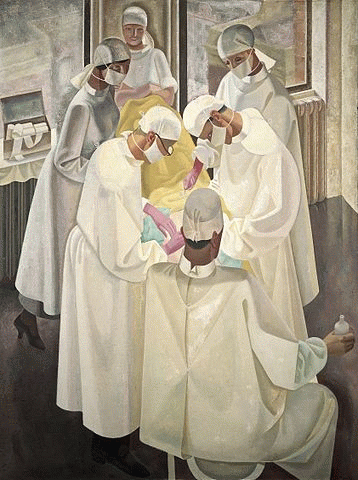
A surgical operation. Oil painting by Reginald Brill, 1934-1935.
(Image by (Not Known) Iconographic Collections/wikimedia commons, Author: Author Not Given) Details Source DMCA
I was intrigued by Dr London's report in December 2016 JAMA of decreased peri-operative mortality in statin users.(1) This result does not seem immediately intuitive. Statin drugs inhibit an enzyme in the liver called HMG-CoA reductase involved in cholesterol production, thereby reducing cholesterol levels. Left Image: Surgeons by Reginald Brill 1934 courtesy of Wikimedia Commons.
Higher Cholesterol is Protective of Post-Operative Sepsis
Higher cholesterol in the surgical patient is protective of endotoxemia, a dreaded complication of non-cardiac surgery that carries a high mortality rate. According to Dr Wilson writing in Critical Care 2003, "lipoproteins can bind and neutralize lipopolysaccharide, hypocholesterolemia can negatively impact outcome." (2)
Severely ILL Patients Have Low Cholesterol
Another observation made by Dr Wilson is that severely ill patients tend to have low cholesterol. If so, then these severely ill patients would not be good candidates for statin drugs in the days prior to their surgical procedure as their cholesterol levels are already low. No need to give a drug to make it lower. On the other hand non-critically ill patients tend to have higher cholesterol values, which does make them good candidates for a statin drug.
The Cholesterol-Endotoxin Hypothesis
This explains the spurious findings of the JAMA article. The patients not taking statins were sicker and had lower cholesterol values, a marker for increased mortality from sepsis.
Conclusion:
Low cholesterol is an excellent marker for increased mortality from sepsis. (3-7) Therefore, driving down serum cholesterol with a statin drug is not a way to reduce surgical complications, most of which are related to post-op sepsis. This study in JAMA by Dr London is therefore a medical hoax, a result of patient-selection bias, not due to any imaginary benefits of statin drugs, which are non-existent. The damage that this JAMA article could produce is frightening, since some surgeons may actually believe it and give their patients statin drugs. This would be a catastrophe of monumental proportions.
Articles with Related Interest:
Low Level Endotoxemia and Cholesterol
Jeffrey Dach, MD
Links and References:
1) Association of Perioperative Statin Use With Mortality and Morbidity After Major Noncardiac Surgery. Martin J London, JAMA Dec 19 2016.
2) Wilson, Robert F., Jeffrey F. Barletta, and James G. Tyburski. "Hypocholesterolemia in sepsis and critically ill or injured patients." Critical Care 7.6 (2003): 1.
(Note: You can view every article as one long page if you sign up as an Advocate Member, or higher).





